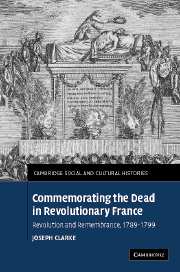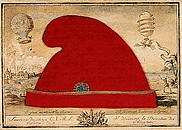Commemorating the Dead in Revolutionary France En ligne
par Joseph Clarke, Trinity College, Dublin

"From attending a memorial mass or commemorative parade to raising a Panthéon or purchasing a cheap political souvenir, the Revolutionary experience of commemoration was a remarkably diverse one, and this diversity raises a whole range of questions, questions concerning the rôle remembrance played in Revolutionary politics, but also questions as to the place of the dead in eighteenth-century French culture. Some of these questions seem obvious, but more only emerged as the sheer complexity of Revolutionary remembrance became apparent in the archives. Nevertheless, the questions that concern me most can be summarised simply enough. What did commemoration mean to the men and women who attended ceremonies, raised monuments and purchased busts and souvenirs in memory of the Revolution's dead ? What traditions did these people draw upon when they came to remember their dead, and how did these evolve to meet the ever-changing demands of Revolutionary politics or change according to the social and cultural circumstances of those who did the remembering ?
In both Paris and the provinces, the variety of forms commemoration assumed was matched only by the diversity of the men it honoured, and this diversity presents its own problems. Honouring an individual with a national reputation like Mirabeau or even an international standing like Voltaire was obviously a quite different experience from attending an artisan's funeral in a Paris church or planting a tree in memory of an undistinguished soldier in a village in the Vaucluse, but how exactly did this difference affect the meaning of these rites? This difference, the difference between celebrating a politician or a philosophe renowned for their accomplishments but unknown as an individual and remembering a local hero, perhaps even a family member or a friend, raises what is, perhaps, the most elusive question of all. In a period when political considerations can so easily appear to overwhelm all other concerns, what private ends did the Revolution's rites of memory serve ? What consolation did commemoration bring to those the dead left behind, and what conflicts did this relationship between the public and the private dimensions of remembrance give rise to ?"
Extrait de l'introduction, disponible sur le site de l'éditeur, de l'ouvrage de Joseph Clarke, Commemorating the Dead in Revolutionary France. Revolution and Remenbrance, 1789-1799, Cambridge University Press, 2007.

